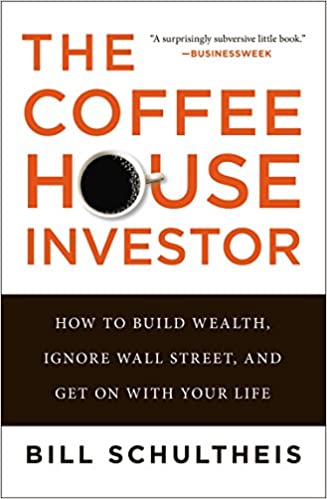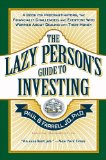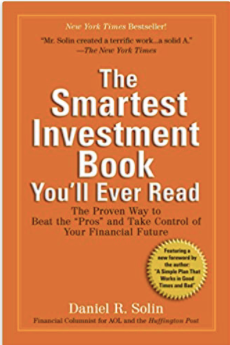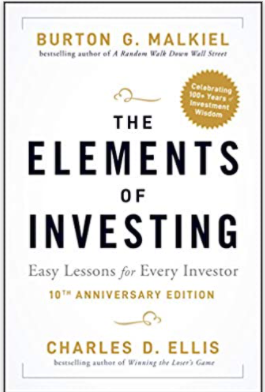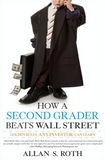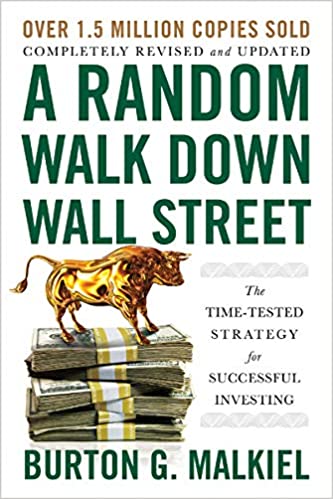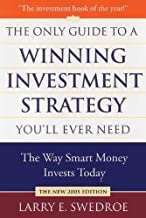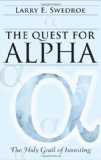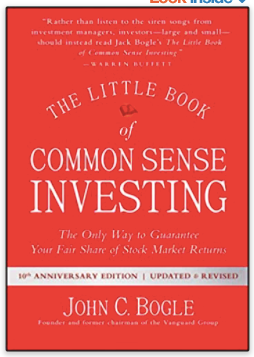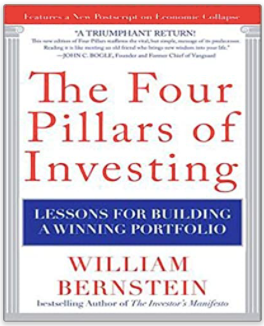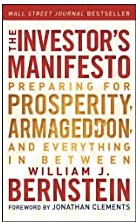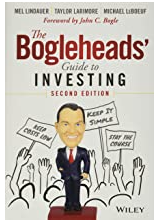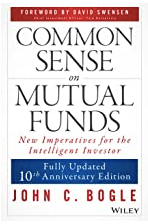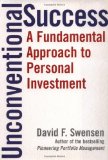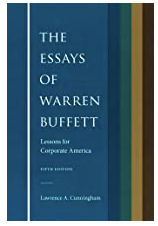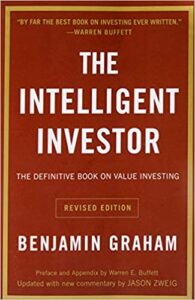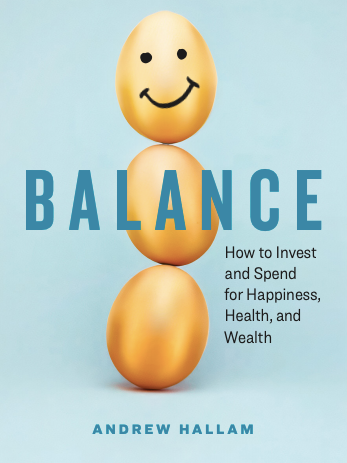
Balance
The #1 New York Times bestselling author, Daniel Pink, says Andrew Hallam's new book, Balance, "is one of the best personal finance books you’ll ever read―because it’s so much more than that. Andrew Hallam has written an insightful guide to spending and investing money, not to impress others but to build a life of satisfaction and significance.”
Order this book to read about real success: how to spend for happiness, how to invest effectively, how to boost life satisfaction and enhance longevity. This might be the world's wisest personal finance book.
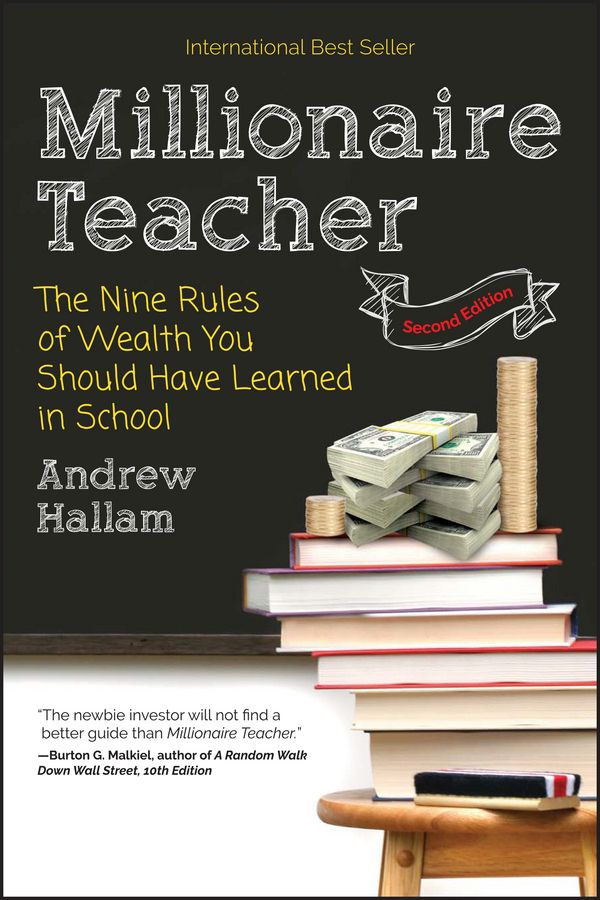
Millionaire Teacher
Millionaire Teacher shows readers how to achieve financial independence through smart investing ― without being a financial wizard. Author Andrew Hallam was a high school English teacher. He became a debt-free millionaire by following a few simple rules. Using stories, personal experiences and humor, Hallam's well-researched and well-written book provides a clear foundation on the world of saving and investing.
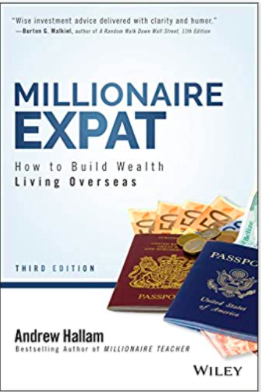
Millionaire Expat
Millionaire Expat (third edition) is a handbook for smart investing, saving for retirement, and building wealth while living overseas. Using evidenced-based investment strategies, Hallam tailors his best advice to the unique needs of those living overseas –no matter where you’re from - to give you the targeted, real-world guidance you need.
Interested in books on Index Fund or ETF Investing?
Based on Amazon and Goodreads reviews, here is a list of The 20 Best-Rated Books On Index Fund Or ETF Investing as of December 2020. Selections were made from books with index fund (or ETF) investing at their premise. Each book title required at least 100 Amazon ratings and at least 100 ratings on Goodreads to be considered.(As an Amazon Associate, I earn from qualifying points)
The 20 Best-Rated Books On Index Fund or ETF Investing *
*Ratings were as of December 3, 2020.
Andrew's Investment Book Suggestions:
As an Amazon Associate I earn from qualifying purchases.
For Beginner Investment Readers
These are the books I’d recommend for people who have never read an investment book before. But don’t mistake simplicity for something substandard. Following the strategies espoused in these books will, after all taxes and costs, have you beating at least 90% of professional money managers over your investment lifetime. That’s a fact.
Millionaire Teacher: The Nine Rules of Wealth You Should Have Learned in School
In this book, I explain some essential financial rules that should be taught in schools… but aren’t
Millionaire Teacher espouses the same investment philosophy as the books below, but there’s a significant difference:
it explains how investment theory was actually put into practice. Just three weeks after being released, it ranked number 2 on Amazon’s hottest new personal finance books.
By November 2011, it was the #1 ranked Personal Finance book on Amazon. I think you’ll like it.
The Coffeehouse Investor: How to Build Wealth, Ignore Wall Street, and Get on with Your Life
In an easy-to-read conversational voice, financial planner Bill Schultheis proves why he’s considered one of the heroes of the financial service industry.
Promoting a low cost, index fund solution to investing, he guides his readers as if he’s your affable neighbour, explaining the process over coffee.
I’ve gifted many copies of this book at my index fund seminars. You’ll like this book.
The Lazy Person’s Guide to Investing: A Book for Procrastinators, the Financially Challenged, and Everyone Who Worries About Dealing With Their Money
Paul Farrell ably introduces this book as something his wife encouraged him to write.
As a women “whose eyes usually glaze over” when he starts to talk finance, you get the idea, right away, that Dr. Farrell’s book is aimed at a broad audience, peppered with a fun writing style that’s missing in the vast majority of personal finance books.
His message is the same as Bill Schultheis’ but his voice is a tad cheekier.
This could be the first and only investment book you’ll ever have to read.
The Smartest Investment Book You’ll Ever Read: The Simple, Stress-Free Way to Reach Your Investment Goals
Cheekier still, but every bit as good, is Daniel Solin’s book, The Smartest Investment Book You’ll Ever Read.
This immodestly titled book is comprised of only 192 pages, and this leading securities arbitration lawyer guides readers to see that again, index fund investing gives the highest statistical chances of success.
With a spacious format, it’s another book you can read in an afternoon while learning how the industry of actively managed mutual fund investing is rigged against the average investor.
Like The Lazy Person’s Guide to Investing and The Coffeehouse Investor, it’s going to make you smile from time to time, if you don’t chuckle out loud.
The Elements of Investing
Perhaps the shortest book of them all, The Elements of Investing was written by investment legends Burton Malkiel and Charles Ellis.
As the bestselling authors of A Random Walk Down Wall Street (Malkiel) and Winning the Loser’s Game (Ellis) they’ve teamed together to produce an investment book that’s far simpler to understand than either of their former masterpieces.
From what I’ve learned, giving financial seminars, the average person has difficulty understanding terms and jargon that most financial writers take for granted.
As great as both of these gentlemen’s other books are, this one is far easier for the average reader to understand.
How a Second Grader Beats Wall Street: Golden Rules Any Investor Can Learn
I bought this book as a gift, initially, but then I had to buy two. I simply couldn’t give the original book away and be left without a copy myself. It’s a fabulous read for new investors. The author, Allan S. Roth, does his readers a wonderful service.
For Intermediate Investment Readers:
These are my favorite intermediate level investment books.
A Random Walk Down Wall Street
Burton Malkiel's A Random Walk Down Wall Street is now in its 12th edition. To my knowledge, Dr. Malkiel's first edition was the world's first book on index fund investing. He wrote it even before Vanguard's John Bogle created the world's first index fund! And this book just keeps getting better. All investors should read it.
The Only Guide to a Winning Investment Strategy You’ll Ever Need: The Way Smart Money Invests Today
I enjoyed Larry Swedroe’s book, The Only Guide to a Winning Investment Strategy You’ll Ever Need and as the title suggests, I think he’s right, although it’s slightly more academic than the previous four books I mentioned.
After reading one of the four books I listed above, if you’re still not convinced, and/or you want more meat, then this could be the book for you.
Written in 2005, it has the qualities of a great book—because it’s timeless. Read this book twenty years from now, and the theory behind it will remain the same: solid, academically rigorous, relevant and accessible to the average reader.
The Quest For Alpha: The Holy Grail of Investing
Swedroe’s new book, The Quest For Alpha: The Holy Grail of Investing is a fabulously convincing read.
If you’re still not convinced that index funds offer much higher statistical chances of success, compared to the expensive products peddled by most financial advisors, then this book will very likely change your mind.
The Little Book of Common Sense Investing: The Only Way to Guarantee Your Fair Share of Stock Market Returns
Written by a man named by Fortune Magazine as one of the four investment giants of the 20th century, Bogle packs a powerful punch with this little 304 page book.
Showing how index funds are superior investment vehicles, he loads the book with evidence and experience drawn from more than 50 years in the investment field.
I’ve gifted more than 40 copies of this little book to my colleagues, but I’ve listed it under “intermediate” as a reader, because it has terms that many of my college educated colleagues couldn’t understand, and it had my dad (a fairly well-read fella) running for the dictionary a number of times.
Bogle is an academic. But he’s brilliant, a clear writer, and he’s definitely fighting for the little guy.
The Four Pillars of Investing: Lessons for Building a Winning Portfolio
Written by the legendary finance writer, William Bernstein, this book gives an extremely solid investment foundation.
If we were to ask Mr. Bernstein himself, he’d probably suggest that we read The Four Pillars of Investing first, and The Investor’s Manifesto second.
In the first book, he thoroughly discusses how people madly become euphoric when fad-like investments rise in value without solid fundamentals to back them up.
The Investor’s Manifesto: Preparing for Prosperity, Armageddon, and Everything in Between
In The Investor’s Manifesto, Bernstein shows how the same emotional madness can sabotage investor’s accounts when the markets drop in value. What’s more, he does it with an ever-improving flair for imagery and humor:
“Your primary training tool is the rebalancing process, which forces you to sell high in the good years and to buy low when there is blood in the streets. In the really bad years, such as 2008-2009, this will mean pouring large amounts into falling equities, when your friends and family are running around like decapitated poultry.”
Both of his books, of course, promote indexed investing as well.
The Bogleheads' Guide to Investing
Probably best for intermediate investors, this book assumes somes basic financial knowledge.
But it’s an impressive read by a couple of millionaire senior citizens who are leaving a useful legacy.
For Advanced Finance Readers
These are my favorite advanced level investment books, but unlike some of the books above, they aren’t entertaining for the average investor. The same message is here that you can read about in Millionaire Teacher, but the evidence here is simply awe-inspiring.
Common Sense on Mutual Funds: New Imperatives for the Intelligent Investor
For the most extensively researched books on indexed investing, nothing really compares with John Bogle’s updated 10th anniversary edition of Common Sense on Mutual Funds: New Imperatives for the Intelligent Investor.
Unconventional Success: A Fundamental Approach to Personal Investment
What’s interesting is that David Swensen, Yale University’s endowment fund manager, didn’t intend to write his book, Unconventional Success, about indexed investing.
But the more he researched, the more he realized that the financial service industry exploited individual investors. His book offers a fabulous solution to that problem.
The Essays of Warren Buffett: Lessons for Corporate America, Second Edition
For advanced investment readers, The Essays of Warren Buffett is a compilation of essays written by the Oracle of Omaha and arranged by Lawrence Cunningham.
If you want to know how the great Berkshire Hathaway chairman thinks, Cunningham has arranged Buffett’s essays beautifully.
The Intelligent Investor: The Definitive Book on Value Investing. A Book of Practical Counsel
The greatest investment advisor of the twentieth century, Benjamin Graham, taught and inspired people worldwide. Graham’s philosophy of “value investing” — which shields investors from substantial error and teaches them to develop long-term strategies — has made The Intelligent Investor the stock market bible ever since its original publication in 1949.
As an Amazon Associate I earn from qualifying purchases


